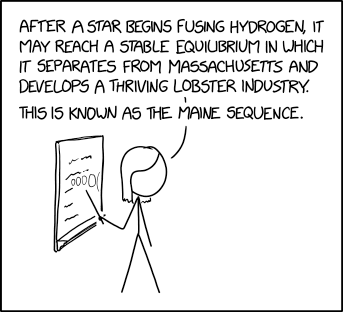2354: Stellar Evolution
| Stellar Evolution |
 Title text: It may remain in equilibrium for some time, slowly growing, and then suddenly become significantly redder. |
Explanation
This is a pun on the main sequence, the continuous and distinctive band of stars that appear on Hertzsprung–Russell diagrams. Stars on this band are known as main-sequence stars. These are the most numerous stars in the universe, and include the Earth's Sun. The main sequence forms a major part of a star's life cycle, with smaller stars spending more time on it, where they transform hydrogen to helium via nuclear fusion to generate energy and sustain themselves.
Miss Lenhart starts off apparently describing the main sequence. However, she veers off into the history of Maine, the most northeastern of the 48 contiguous US states. She mentions the separation of Maine from Massachusetts and its lobster fishing industry, similar to how, soon after the beginning of their lifespans, stars evolve from early stages (like T-Tauri stars) and go onto the main sequence, where they become stable and stay for a long time. She makes a play between "main" and the U.S. state of "Maine", which are homophones. The allusion to stars might also be a reference to the representation of individual states as stars on the canton of the US flag.
Title text
The title text puns on either the state or the star slowly growing for a long time, before suddenly becoming "redder". In the case of the state, the population of Maine has been slowly but steadily growing over the last century, increasing from about 700,000 in 1900 to about 1,350,000 in 2020.[1] Similarly, stars with a mass of 0.6–10 M☉ slowly grow while they are on the main sequence, then increase in size and leave the main sequence in the subgiant phase, before suddenly becoming red giants.
In American politics, "red" most recently refers to the Republican party (NBC showed Republicans in blue and Democrats in red until 1996, and CNN until 1992). While in the past Maine has frequently voted for Democratic party candidates, Republican party candidates have increasingly won more campaigns or lose campaigns with larger minorities of the vote. For instance, Maine, which has used a district-based voting system, voted in its entirety for the Democratic party presidential candidates in the 1992, 1996, 2000, 2004, 2008, and 2012 presidential elections, but one of its districts voted for Republican candidate Donald Trump in 2016 and 2020. Meanwhile, a main sequence star transitions eventually into a red giant, also becoming "redder". Alternatively, the color change could refer to lobsters; when one is cooked, it turns from a bluish-green to a bright red-orange. "Red" is unfortunately also used in the derogatory terms "rednecks" for rural lower income folks (Maine is a predominantly rural, lower income state), and "redskins" for indigenous Native Americans (discussion of indigenous empowerment has been rising in Maine).
Transcript
- [Miss Lenhart stands in front of a chalkboard. On the board are squiggly lines of text and a series of growing circles]
- Miss Lenhart: After a star begins fusing hydrogen, it may reach a stable equilibrium in which it separates from Massachusetts and develops a thriving lobster industry.
- Miss Lenhart: This is known as the Maine Sequence.
Discussion
No comment. Lightcaller (talk) 01:32, 3 September 2020 (UTC)
- No reply. Tsumikiminiwa (talk) 23:38, 3 September 2020 (UTC)
Are we sure the title text references cooking a lobster? I was fairly certain it was an allusion to partisan politics in Maine using the traditional blue/red framework. A quick scan of the Wikipedia page on Maine politics seems to support that. 108.162.215.222 03:19, 3 September 2020 (UTC)
- I, on the other hand, was wondering why the politics came into it, when it was clearly just star+lobster reference... Strange, eh? 141.101.107.156 03:56, 3 September 2020 (UTC)
- I'm sure it could be both. 162.158.75.128 11:11, 3 September 2020 (UTC)
- I'm not at all sure that the stats actually match the supposed analogy, without a long stretch of imagination to ignore the 'purple divide' yet uncrossed. And I don't get the feeling that Randall would be even wanting to joke that anywhere may "suddenly become significantly redder". But that's just IMO. 162.158.158.241 14:29, 3 September 2020 (UTC)
- I don't believe it has anything to do with politics - how does the slowly growing part fit in? That is just reading too much into it.
- The 'slowly growing' part would be a reference to the fact that the population of Maine (as well that of most other states, the country, and the planet as a whole) has been steadily increasing for most of its history. Main has become significantly redder because even though it is still fairly blue it is less blue and therefore, in US political terminology, more red 162.158.78.198 02:50, 10 September 2020 (UTC) 192.186.1.246172.69.135.170 06:37, 4 September 2020 (UTC)
No mention in the explanation about the fact that US states are also "stars" (50 stars for 50 states on the US flag)? Or is it just too obvious?162.158.154.185 08:23, 4 September 2020 (UTC)
Congratulations! Your Main Sequence Star evolved into Red Giant.172.70.135.218 19:45, 18 April 2022 (UTC)
